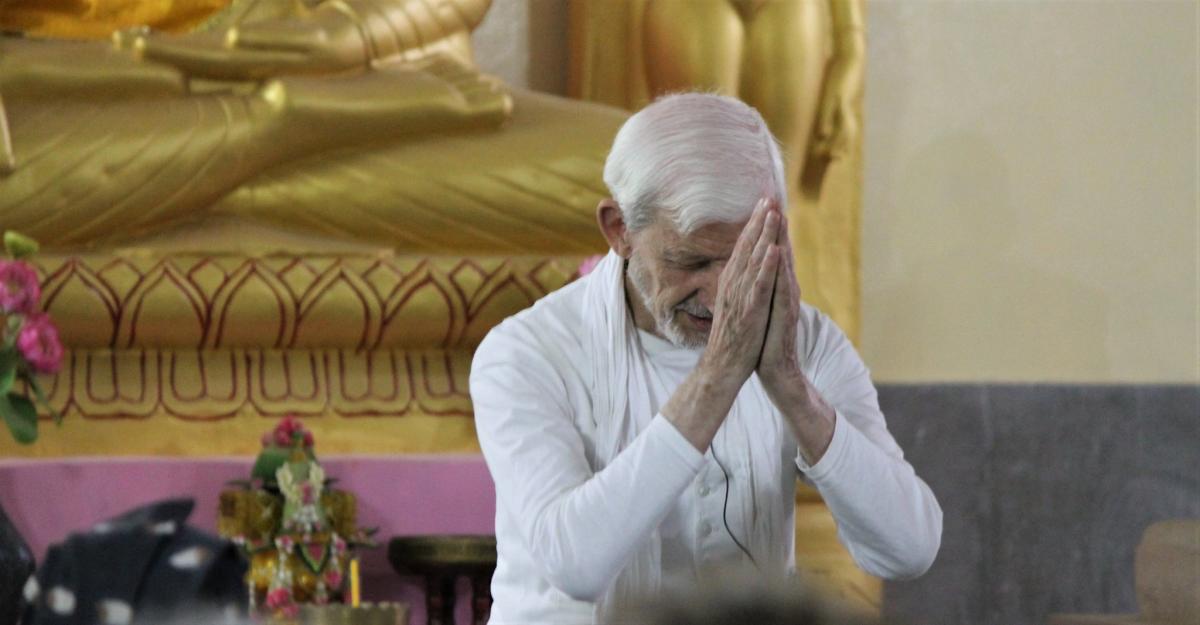Christopher Titmuss, a senior Western teacher in the Buddhist tradition, explores a vegan diet from a Buddhist perspective
 I’ve had the privilege of spending around 20% of my adult life in the East, including four years in Thailand and five years in India.
I’ve had the privilege of spending around 20% of my adult life in the East, including four years in Thailand and five years in India.
For over two years as a Buddhist monk I wandered barefooted the length and breadth of India, from the Himalayas to the far south of the country. Throughout these journeys via public transport, I stayed in ashrams, monasteries, spiritual centres and people's homes.
I cannot recall a single occasion as a monk or later, as a lay person, receiving or being invited to eat any part of an animal which includes birds and fish. In India, sadhus, yogis and spiritual seekers have adopted primarily vegan meals since long before the time of the Buddha. Farmers take milk from cows for dairy products, including butter, cheese and cakes. These food items are not essential to the diet.
Sanghas of practitioners (spiritual assemblies, networks) ate healthy, organic, nutritious predominantly vegan meals with eggs as an optional. It is important to recognise that this long tradition of healthy vegan food continues today for many Sanghas but also expands into the life of householders.
Sadly, Bhikkhus (Buddhist monks and bhikkhunis (Buddhist nuns) in Buddhist countries eat what laypeople offer, including meat. This view gradually undergoes change in the major traditions of Mahayana and Theravada.
Vesak – A Time for Reflection
Vesak marks the birth, enlightenment and death of the Buddha on the Full Moon, usually in May. Many householders come to the monastery with prepared food for the monastics to celebrate this remarkable day in human history, marking the full awakening of Gotama.
His profound teachings continue to impact the daily lives of 500 million Buddhists worldwide and indirectly on the lives of millions of thoughtful people. The Buddha commented that food is an obvious fundamental requisite. He stated we cannot think about spiritual matters unless we have food to eat daily.
Teachings of wisdom include diet. Some transition in a gradual or sudden way from a meat-based or vegetarian diet to a vegan one.
What is the difference between a vegan diet and plant-based diet?
Many people use the two concepts, vegan and plant-based, in interchangeable ways; but it is important to note the difference in meaning.
A vegan diet excludes all animal products, including all animals on the land and in the water, as well as dairy, eggs, honey, and any other ingredients derived from animals. A vegan diet gives emphasises ethics, animal welfare and the environment, along with health factors.
People often adopt a plant-based diet for health reasons, and may add from time to time some meat, dairy or eggs to their diet.
What is the motivation to change to a vegan diet?
My experience reflects the experience of many others with three primary motivations.
1. Non-violence
2. Health
3. Compassion
All three areas are key features in the best of the Buddhist traditions.
The shift to letting go of eating animals and all consumption of dairy products and minimising ultra processed food makes a significant difference to our health.
-
Non-violence, non-harm (ahimsa). The teachings of non-harm, non-violence make up a fundamental teaching of the Buddha, expressed in the Noble Eightfold Path, ethics of non-killing, and right intention in the second link in the eightfold path. Non-violence belongs to a body of teachings, including ethics, kindness, compassion, mindfulness, meditation, tolerance, conditioned arising, wisdom and liberation.
In the 1970s during my years as a Buddhist monk, I became a vegetarian to support my spiritual practices.
-
Health. Let us remember what we put in our mouth affects every cell - food, drink, and inhaling smoke will harm us if the product is harmful. Our body and mind respond to fresh, organic food, eaten mindfully giving support to our wellbeing.
In 2006, I adopted a vegan diet after enduring severe pain from stones in my gallbladder. My family had this vulnerability for four generations. My doctor advised the removing my gallbladder. I said, “First, I want to try a diet.” I switched to a largely fat-free vegan diet. I have not experienced pain in this area since. A health issue motivated the change.
-
Compassion for animals. Farmed animals find themselves destined for the abattoir. Animals share similar feelings and mental capacities as babies or very young children. Compassion motivates the change to adopt a vegan diet as a force to help protect animals.
As a Buddhist monk in Thailand, I lived in the forest and spent nine months in a cave. I lived close to creatures on the ground, spending much time under the ground, in the air, trees and water.
The Buddha and the Buddhist tradition remind us regularly of our relationship to humans and nonhuman animals. Sabbe Satta Sukhita Hontu. May All Beings be Happy (such as being free from fear, free from violence).
‘Livestock’ and the Environment
Farmed animals are responsible for around 12% – 20% of global greenhouse gas emissions, because of methane and nitrous oxide from cows and sheep. The impact contributes to climate change, as we witness worldwide.
Farmed animals produce vast amounts of manure every day with elevated levels of nitrogen and phosphorus excreting into rivers, lakes and streams, which harm fishes and pollute the waterways. Animal farming in the UK generates around 400,000 tonnes of excreta/day - poisoning farmland, rivers, the sea and the air.
The Buddha’s teachings give much emphasis on harmony with the natural world of elements of earth, air, heat, water and space. He protested about the sacrifice of animals for religious/secular reasons.
Farmed animals and the transport sector on the roads, seas and in the air contribute significantly to environmental impact and climate change, states the Food and Agricultural Organization of the United Nations (FAO).
None of this kind of environmental impact was an issue in the time of the Buddha. Abuse and violence on the elements have grown in significant ways in recent decades affecting our environment and climate.
As a servant of the Buddha-Dharma (teachings/practices), I have been teaching for five decades, with many conversations on the ethics of changing one’s diet.
Four areas that bring about resistance to a change of diet for Buddhists and others.
-
The Buddha regularly said that his ordained Sangha accepts what laypeople give in terms of food. Buddhists often believe the Buddha was a meat eater. I doubt it. Laypeople in India do not have a history of offering, or very rarely, meat to the ordained or spiritual seekers in any tradition. It is not a reason to keep on eating meat.
-
The Buddha died from poison wild mushrooms, but many Buddhists believe he died from meat poisoning. It is not a reason to eat meat, even if the Sangha of ancient times ate meat.
-
I hear from people “I need my protein.” This common view arises because of massive advertising from the meat industry. Plants offer the best protein with no side effects, and are also rich in fibre, vitamins and minerals. Examples include lentils, chickpeas, black beans, kidney beans, soy products, tofu, and tempeh. There are nuts and seeds such as almonds, peanuts, chia seeds, hemp seeds, pumpkin seeds, which contain protein. Whole grains, quinoa, oats and brown rice are also rich in protein.
-
“I really like the taste of chicken and fish.” We apply the practice of non-violence, non-harm, to ourselves, as well as our relationship to people, creatures and the natural world. We can harm ourselves due to what we put in the mouth, resulting in becoming overweight, obese, stricken with cancer, heart disease, high blood pressure and more. To put it simply, plant-based food can contribute to health.
Dharma teachings are not a proselytising religion, instead they employ ethics, mindfulness, meditation, insights and wisdom with supportive practices.
A healthy diet is a key, an indispensable feature of wise living. Our exploration can include awareness of clothing cosmetics and other consumer goods using animal products.
In the UK, the number of vegans in the UK grew by 1.1 million between January 2023 - January 2024, according to Food Manufacture. Over 20 percent of children in the UK are already vegan or would like to become vegan soon. Eight percent of children aged five to 16 were following a vegan diet, while thirteen percent were vegetarian.
Many enjoy the diversity of tastes and benefits. Their families will benefit when these young people become parents, as well as animals and the natural world.
I remember
I remember Nshorna, my five-year-old daughter, going to a birthday party of one of her school friends near our home in Totnes, Devon, England. At the time, our home was a vegetarian household.
When she returned home, she said to me, “Daddy, I had a lovely time at my friend's birthday party, but the children were eating bits of animals around the table”. She looked shocked. It hadn't occurred to her that other families were neither vegetarian nor vegan. Today, Nshorna is the founder and CEO of the Wise Lotus Centre for wellbeing in Hertfordshire, England.
Let us reflect on the joy and widespread benefits in all directions of adopting a vegan diet.
May all beings live mindful lives
May all beings connect with a wise diet
May all beings support people, creatures
And the natural world
About Christopher Titmuss

Christopher Titmuss, a senior Western teacher in the Buddhist tradition, offers teachings/practices in retreats/workshops, and a voice for social/political/global change.
Poet, photographer, blogger and social critic, he is the author of 24 books including Light on Enlightenment, Spiritual Roots of Mindfulness and The Political Buddha.
A former Buddhist monk in Thailand and India, Christopher is the founder of the 12-month online Mindfulness Teacher Training Course (MTTC). He is UKs senior mindfulness teacher.
He lives in Totnes, Devon, England. He is the grandfather of four children. From the 1970s, Christopher was a vegetarian and became a vegan in 2006.
The views expressed by our bloggers are not necessarily the views of The Vegan Society.

